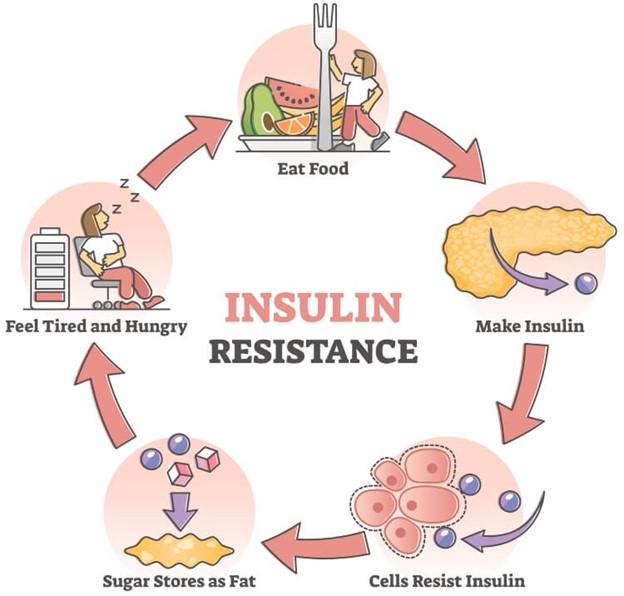How to Tell If You’re Insulin-Resistant
Insulin resistance is a significant health concern affecting roughly one in three American adults. If left undiagnosed and untreated, it can lead to type 2 diabetes and other health complications. Learn more about insulin resistance and how to reverse it to protect your health.
What is Insulin Resistance?
When you eat, your digestive system breaks down the sugars in your food and releases them into your bloodstream. The rising blood sugar level signals your pancreas to secrete a hormone called insulin. Insulin attaches itself to insulin receptors on cell membranes, forming a gateway that allows sugars to enter the cells and provide them with the energy they require.
Insulin resistance arises when these insulin receptors become dysfunctional. When this happens, the receptors demand higher levels of insulin to create a gateway for sugars to enter the cells. Over time, this increased demand for insulin exhausts the pancreas. At the same time, excess sugar lingers in the bloodstream, giving rise to various health complications.
Eventually, insulin resistance progresses to the point where it becomes diabetes. While this may sound alarming, there’s a silver lining—with the right lifestyle changes, you can halt the progression of insulin resistance and even fully reverse it.

What Causes Insulin Resistance?
Several factors contribute to the development of insulin resistance, including:
- Age: Your risk for insulin resistance increases after age 45 due to a natural decline in muscle mass and increased body fat.
- Genetics: Insulin resistance can run in families, suggesting a genetic predisposition to the condition. People of African-American, Hispanic, Indian, and Native American descent also have a higher risk of insulin resistance.
- High-sugar or high-carb diet: Consuming excessive amounts of sugar and refined carbohydrates causes repeated blood sugar spikes, requiring more insulin to maintain stability and leading to insulin resistance.
- Obesity: Carrying excess body weight, especially around your middle, increases the production of cytokines, proteins that interfere with the healthy functioning of your insulin receptors.
- Chronic stress: Prolonged stress raises cortisol levels, a stress hormone that causes the liver to release sugar into the bloodstream. This interferes with insulin function and wears out insulin receptors prematurely.
- Poor sleep: Insufficient or poor-quality sleep leads to hormonal imbalances, including higher cortisol levels, which affect insulin sensitivity.
Signs of Insulin Resistance
The Centers for Disease Control and Prevention (CDC) estimates that four in five people with insulin resistance don’t know they have it. Early insulin resistance symptoms include:
- Low energy levels relieved by eating
- Excessive sleepiness midday or after eating
- Feeling hungry again shortly after eating
- Sugar and carbohydrate cravings
- Irritability
- Headaches
- Dizziness
- Sleep disturbances
These symptoms are easy to overlook, but whether you notice them or not, insulin resistance damages your body long before you receive an official diabetes diagnosis.
How to Test for Insulin Resistance
The only way to know for sure if you have insulin resistance is to test for it. The tests that can determine insulin resistance include:
- Fasting glucose test: This blood test measures blood sugar levels after an overnight fast. Its purpose is to diagnose diabetes and monitor blood glucose levels in people with this condition. Normal fasting blood sugar levels are between 70 and 100 mg/dL.
- Oral glucose tolerance test (OGTT): This diagnostic test detects diabetes or impaired glucose tolerance. It measures blood sugar levels before and after consuming a sugary solution to evaluate how well the body processes sugar. Normal glucose levels after two hours should be below 140 mg/dL.
- Four-Hour Kraft Insulin Survey: This test assesses insulin secretion and insulin resistance. It measures insulin and glucose levels while fasting and at specific intervals over a four-hour period after drinking a sugary solution. As the gold standard for testing insulin resistance, this survey is often used to diagnose early-stage diabetes and identify individuals at high risk for developing this disease. The test results help clinicians determine the best course of treatment for people with insulin resistance or prediabetes.
Insulin Resistance Causes Numerous Health Risks
We’ve already discussed how insulin resistance leads to diabetes. But did you know diabetes can cause a slew of health problems as well? Here are the conditions you help prevent by working to reverse insulin resistance:
- Cardiovascular disease
- Heart attack and stroke
- Gum disease
- Nerve damage
- Vision and hearing loss
- Erectile dysfunction
- Kidney disease
- Foot pain
- Skin infections
- Depression
- Dementia
How to Reverse Insulin Resistance
Now that you know the importance of reversing insulin resistance, the next step is to change your lifestyle and make it happen. Here’s what to do:
- Eat fewer calories overall: Reducing your caloric intake is the number-one way to lose weight, which helps improve insulin sensitivity.
- Eat more nutrient-dense and fiber-rich food: Consuming more vegetables, lean meats, whole grains, and legumes regulates your blood sugar levels and improves insulin function.
- Reduce your sugar and carbohydrate intake: At the same time, limit the amount of added sugars and refined carbohydrates in your diet to prevent blood sugar spikes and reduce the demand on your pancreas.
- Get the right amount of sleep: Aim for seven to nine hours of quality sleep each night to balance your hormones and support overall health.
- Exercise more: Regular physical activity promotes weight loss, improves insulin sensitivity, and lowers blood sugar levels. Strive to get at least 150 minutes of moderate-intensity aerobic exercise and two strength-training sessions per week.
Quality Primary Care in Brevard County
At Brevard Health Alliance, we understand the importance of detecting and treating insulin resistance early. Our primary care physicians provide comprehensive, patient-centered service to help you manage and reverse insulin resistance. If you notice symptoms of this condition or think you’re at risk for developing it, don’t hesitate to contact us. We’re happy to share more about our primary care services and help you set an appointment at one of our several locations in Brevard County, FL.
















































































































































